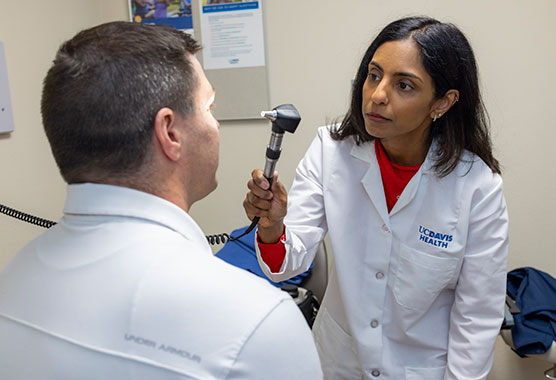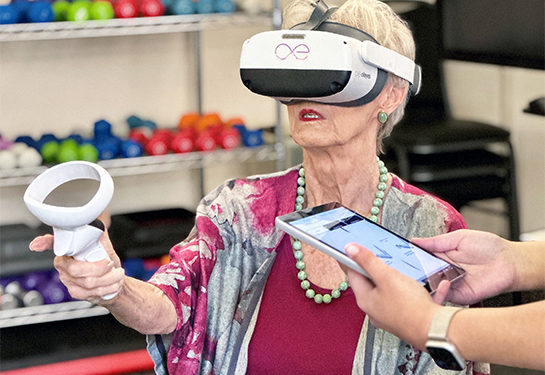Glaucoma
From early diagnosis to proven treatments and clinical trials, we have what you need to manage glaucoma and prevent vision loss.
Medically reviewed by Michele Lim, M.D. on Aug. 07, 2023.

Experts Ready to Help Preserve Your Vision
At UC Davis Health, we offer leading-edge glaucoma diagnosis and treatment to preserve as much of your vision as possible.
What Is Glaucoma?
To understand what glaucoma is, you first have to understand how sight works:
- When light enters your eye, it travels through several inner structures to reach your retina. Your retina is at the back of your eye.
- Your retina changes the light into electrical signals. It then sends them to your brain via your optic nerve. Your optic nerve is made up of nerve fibers that the signals can travel on.
- Your brain then translates the electrical signals, so you can understand what you are seeing.
Glaucoma is an eye disease that damages your optic nerve over time. Without treatment, it can cause vision loss and blindness.
Glaucoma Symptoms
Symptoms differ depending on the type of glaucoma you have. Open-angle glaucoma, the most common type in the United States, can progress for years without any signs.
As it progresses, you may experience increasing vision loss, starting with your peripheral vision. Vision changes can be hard to notice because they happen so gradually.
Emergency Symptoms
Primary angle closure glaucoma is a rare but serious condition. Without immediate treatment, it can permanently damage your vision.
If you experience any of these closed-angle glaucoma symptoms, seek emergency care right away:
- Blurry or altered vision, haloes, rainbow effect in vision
- Intense headache
- Nausea and vomiting
- Red eyes
- Severe eye pain
Causes and Risk Factors of Glaucoma
Glaucomas are either primary or secondary. Primary glaucomas develop on their own. Secondary glaucomas occur because of other health conditions or features of the eye that may cause the disease.
Researchers do not know what causes primary glaucoma. But a key feature is degeneration of the optic nerve. The pressure of the eye is a risk factor that is related to this degeneration.
High eye pressure happens when eye fluid (aqueous humor) does not drain from your eye normally. This pressure then damages your optic nerve.
Some factors can increase your risk for glaucoma, including:
Age
Glaucoma is most common in people older than 55.
Ethnicity
African Americans as well as Asian and Hispanic people are more likely to develop glaucoma.
Family History
If you have family members with glaucoma, you are more likely to develop it.
Certain Medical Conditions
Having diabetes, high blood pressure, sickle cell anemia, corticosteroid use, and injury can increase your risk for secondary glaucoma.
Diagnosing Glaucoma
Diagnosing glaucoma starts with an eye exam. To see the back of your eye better, your provider dilates your eyes. During eye dilation, your provider painlessly widens your pupils (the black circle in the center of your eye) using special eye drops.
With your eyes dilated, your provider can examine the optic nerve. To ensure the most accurate diagnosis possible, we also use advanced diagnostic tools when needed. These tools include visual field testing and advanced imaging techniques, such as 3D imaging and high-resolution ultrasound.
Glaucoma Treatment at UC Davis Health
In the UC Davis Eye Center, our team of nationally recognized glaucoma specialists cares for you. They work together to prevent vision loss and optimize your eye health.
Our eye specialists are active glaucoma researchers. Their role in important national glaucoma clinical trials means your care includes the latest breakthroughs — sometimes before they are available to the public.
Prescription Medications
Eye drops may help reduce eye pressure and can prevent vision loss.
Laser Therapy (Laser Trabeculoplasty)
During laser therapy, your provider uses intense light energy to increase the drainage of the aqueous humor fluid in the eye. Aqueous humor is responsible for eye pressure.
Glaucoma Surgery
Our ophthalmologists offer the full range of surgeries that help drain excess eye fluid. They are also among a small group of surgeons around the world studying minimally invasive glaucoma surgery in clinical trials.
Preventing Glaucoma
It is not possible to prevent glaucoma — but you can prevent the vision loss it causes. That’s why regular eye exams are so important.
At UC Davis Health, our eye specialists give thorough exams using sophisticated diagnostic tools. Their experience helps catch glaucoma early, when treatments can have the most impact. Learn more about our glaucoma care.
Who does glaucoma affect?
3MAmericans have glaucoma
Glaucoma is the
2ndLeading cause of preventable blindness worldwide
What kind of glaucoma is most common?
9 in 10Americans with glaucoma have open-angle glaucoma
Sources: Centers for Disease Control and Prevention (CDC): Don’t Let Glaucoma Steal Your Sight!
National Eye Institute: Types of Glaucoma
Request an Appointment
As Sacramento's No. 1 hospital, you'll benefit from unique advantages in primary care and specialty care. This includes prevention, diagnosis and treatment options from experts in 150 specialties.
Referring Physicians
To refer a patient, submit an electronic referral form or call.
800-4-UCDAVIS
Patients
Call to make an appointment.
Consumer Resource Center
800-2-UCDAVIS

Ranked among the nation’s best hospitals
A U.S. News & World Report best hospital in cardiology, heart & vascular surgery, diabetes & endocrinology, ENT, geriatrics, neurology & neurosurgery, and pulmonology & lung surgery.

Ranked among the nation’s best children’s hospitals
U.S. News & World Report ranked UC Davis Children’s Hospital among the best in pediatric nephrology, orthopedics*, and pulmonology & lung surgery. (*Together with Shriners Children’s Northern California)

Ranked Sacramento’s #1 hospital
Ranked Sacramento’s #1 hospital by U.S. News, and high-performing in aortic valve surgery, back surgery (spinal fusion), COPD, colon cancer surgery, diabetes, gynecological cancer surgery, heart arrhythmia, heart failure, kidney failure, leukemia, lymphoma & myeloma, lung cancer surgery, pacemaker implantation, pneumonia, prostate cancer surgery, stroke, TAVR, cancer, orthopedics, gastroenterology & GI surgery, and urology.

The nation’s highest nursing honor
UC Davis Medical Center has received Magnet® recognition, the nation’s highest honor for nursing excellence.

World-class cancer care
One of ~59 U.S. cancer centers designated “comprehensive” by the National Cancer Institute.

A leader in health care equality
For the 13th consecutive year, UC Davis Medical Center has been recognized as an LGBTQ+ Healthcare Equality Leader by the educational arm of America’s largest civil rights organization.

